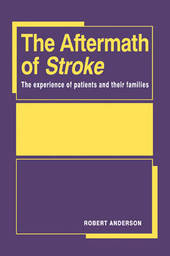
|
The Aftermath of Stroke: The Experience of Patients and their Families
Paperback / softback
Main Details
| Title |
The Aftermath of Stroke: The Experience of Patients and their Families
|
| Authors and Contributors |
By (author) Robert Anderson
|
| Physical Properties |
| Format:Paperback / softback | | Pages:276 | | Dimensions(mm): Height 228,Width 152 |
|
| ISBN/Barcode |
9780521029827
|
| Classifications | Dewey:616.8 |
|---|
| Audience | | Professional & Vocational | |
|---|
| Illustrations |
Worked examples or Exercises
|
|
Publishing Details |
| Publisher |
Cambridge University Press
|
| Imprint |
Cambridge University Press
|
| Publication Date |
2 November 2006 |
| Publication Country |
United Kingdom
|
Description
Stroke affects the personal, social, professional and family lives of patients and their carers. This book is based on a study in which 175 stroke patients and their family carers were followed from the time of the stroke for a period of eighteen months. It tells of their experience of the illness and examines their patterns of coping, including physical, social, economic and emotional aspects. The words of the patients and their carers illuminate these histories of life after stroke, vividly expressing the difficulties encountered with the services designed to help them. At a time when the health and welfare services in many countries are rethinking their strategies for community care, this study underlines the importance of social factors in recovery after stroke. Written for doctors and other health care workers involved with stroke patients, this careful and comprehensive account will direct attention to practices which can improve the quality of life for people with chronic illness, and their carers.
Reviews'This is a fascinating and thought-provoking book of relevance to anyone involved in the care and rehabilitation of stroke patients and their families.' Andrew Carson, British Journal of General Practice 'If you are concerned with any aspect of stroke and wish to learn more about its everyday meaning you should read this book.' Graham P. Mulley, British Medical Journal
|